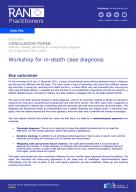Details
- Publication date
- 31 January 2022
- Author
- Directorate-General for Migration and Home Affairs
- RAN Publications Topic
- Community policing
Description
On the mornings of 16 and 17 December 2021, a group of experienced police officers gathered online to diagnose and discuss four different real-life cases. The cases varied in type of extremism and came from different regions and countries: a young boy returning from Deash territory; a prison officer who was prevented from carrying out right-wing extremist attacks; a released terrorist enrolled in a re-socialisation programme who kills two persons; a Salafist-Jihadist convert convicted of robbery who after release re-engaged with his old Salafi-jihadist friends.
The case of the child returnee focused on social diagnosis, which is an important method to decide on preventive measures for long term comprehensive programmes and short-term actions. The other cases were a diagnosis of police interventions to decide with a debriefing what the police did right and what could they have done better. The diagnosis and discussions aimed at understanding how a holistic diagnosis can support police in achieving their goals, what the lessons learned are from their approach, and how cases with a potential risk should be managed.
The main lessons learned from these four cases are that there is a need for a methodological approach that combines:
• Thorough diagnosis: The aim is to really get to know the subject/individual and try to make the difference. For this holistic approach, police need partner organisations.
• Systemic working: In addition to an individual-centred approach, there is also a need to work with the networks surrounding the individual such as families and communities.
• Mitigating risks and prevent future violence: The cases demonstrated that it is not enough to diagnose and monitor, it is also necessary to combine with interventions aimed at mitigating risks and prevent future violence. A tailor-made approach based on the risks, needs and strengths is important. Once again, police cannot do it alone.
This paper summarises the main conclusions following the four real-life cases diagnosed during the meeting. The paper also describes the reoccurring approaches to the cases and its challenges. Recommendations about methodology and the role of police in the multi-agency approach are also presented. Follow-up and inspiring practices are outlined.

